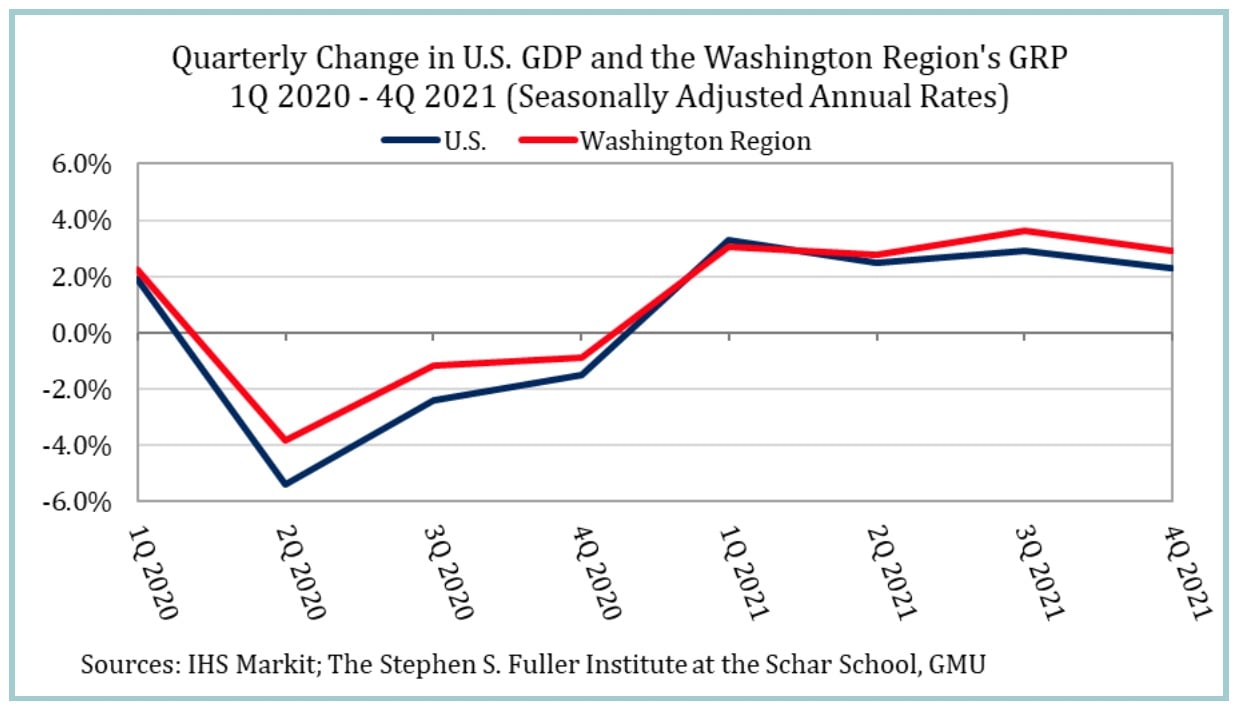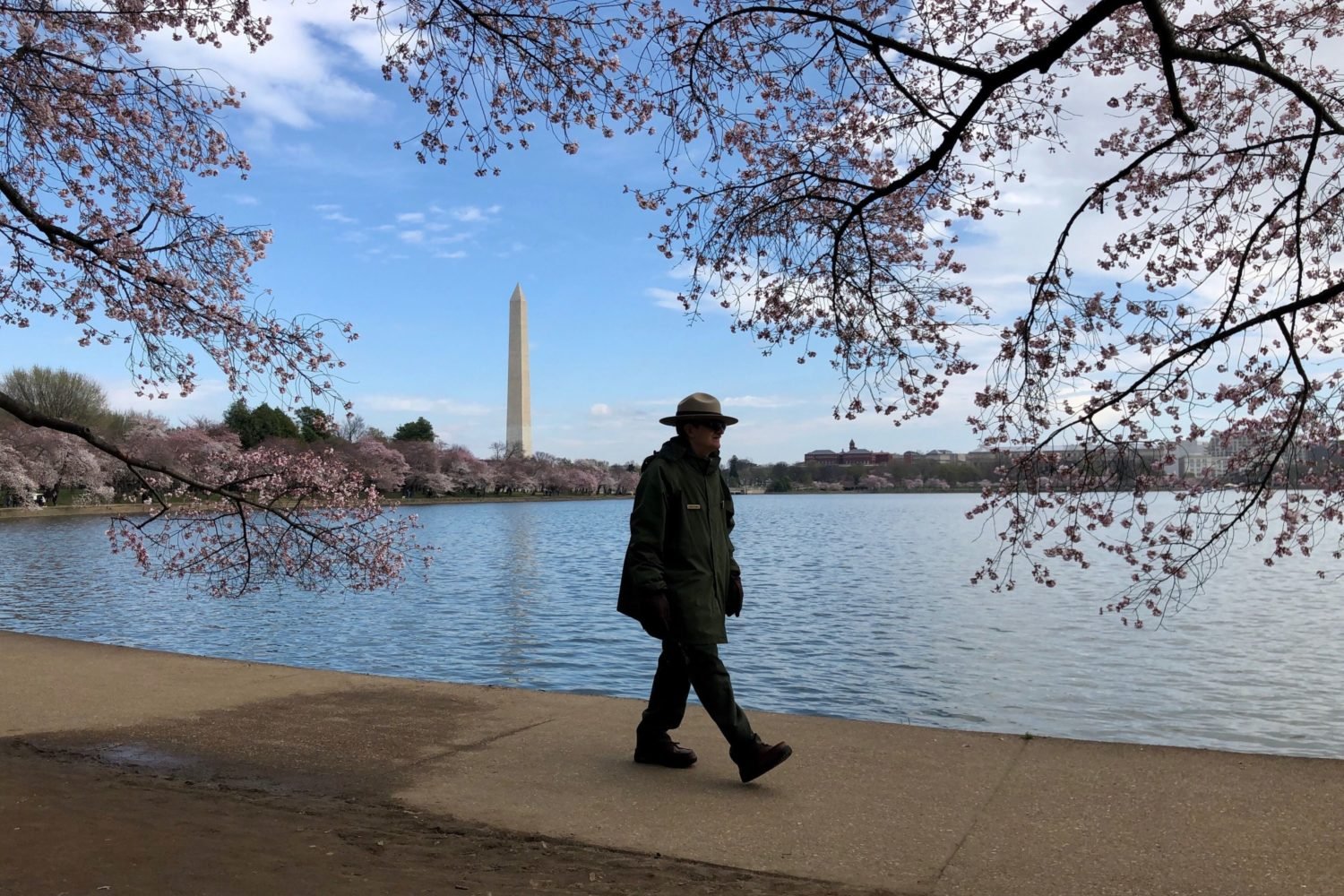About Coronavirus 2020
Washingtonian is keeping you up to date on the coronavirus around DC.
Washington’s economy will stall out this year as a result of the Covid-19 pandemic, inching up just .1 percent over 2019, according to projections released today by the The Stephen S. Fuller Institute at George Mason University. Unlike previous economic pullbacks, Uncle Sam won’t be able to shield us from the pain; the region’s economy will contract for the last three quarters of the year. But for jittery residents, there’s also some good news: The researchers expect federal activity in Washington to fuel a stronger recovery in this region than in other parts of the country.
Read the full report here.
Highlights of the report:
“The Washington region’s economy will also contract in the last three quarters of 2020, primarily because of decreased consumer spending and lost productivity. The Washington region’s businesses are modestly less dependent on international manufacturing and are better positioned for their workers to work remotely, so the pattern of economic decline differs slightly. The Washington region’s performance will be similar to most of its peer metros, which are typically knowledge-based economies, and its role as the national capital will not insulate it from the majority of coronavirus’s economic effects.”
“In a typical recession, the federal government is a stabilizer for the region by being a consistent, or growing, source of income for a significant share of local business and households. In turn, these federally dependent businesses and households spend money at other local businesses, supporting secondary activities even during a business cycle downturn. In this downturn, households and business will reduce expenditures at local businesses even if their incomes are unchanged as households, business, and governments implement strategies to flatten the curve of the pandemic. Similarly, the loss of productivity in the region will be because of workers that stay home, including losses from those that have shifted to working remotely. Federal workers and contractors will have the same difficulties working remotely as other office workers, in aggregate, especially because security requirements will preclude many from performing their normal tasks.”
“However, the Washington region’s recovery from the pandemic will be somewhat stronger compared to the U.S. as a result of the outsized role of the federal government in the region. The source of funding and the workforce of the federal government and federal contractors will be less affected by the disruption, making it easier for both the businesses and the associated households to resume normal operations.”
“The domestic outbreak will reduce tourism to unprecedented levels. The most comparable recent event was the September 11, 2001 attacks, although the total magnitude of the decrease resulting from the pandemic will likely be larger.”
“The workers in service industries that rely on discretionary spending will also have the largest rates of wage reductions and lay-offs and, while this will not be an outsized contributor to the region’s economic losses, it will be the largest source of unemployment and disproportionately affect lower income households. About 23 percent of residents in the Washington region work in these service industries as their main job, a total of 760,000 residents. … If just 15 percent of this workforce is laid-off, an additional 114,000 workers will become unemployed, increasing the region’s unemployment rate to 6.4 percent from the 2019 average of 3.1 percent. If 30 percent of this workforce is laid-off, even temporarily, the additional 228,000 unemployed workers would increase the regional unemployment rate to 9.7 percent.”
“If social distancing measures are in place past June 2020, the economic losses will be compounded; that is, the losses will not scale proportionally with each additional month of the coronavirus pandemic. The sharp decrease in consumer spending during a one-quarter pandemic is not the result of commensurate losses in income during this period but is the result of significant decreases in consumer confidence and the inability to freely access restaurants, retailers and other service providers. The longer the pandemic continues, the more likely it is that total household income in the region will decrease significantly enough to suppress the consumer spending post-pandemic, subsequently delaying the economic recovery. Similarly, businesses will have more difficulty absorbing lost productivity over time; small business and industries that rely on discretionary spending typically operate with smaller margins and will be the first to cut costs, while larger businesses that consist of salaried workers are more able to have workers take paid leave for several weeks if work cannot be performed at home.”



![Luke 008[2]-1 - Washingtonian](https://www.washingtonian.com/wp-content/uploads/2017/10/Luke-0082-1-e1509126354184.jpg)
















